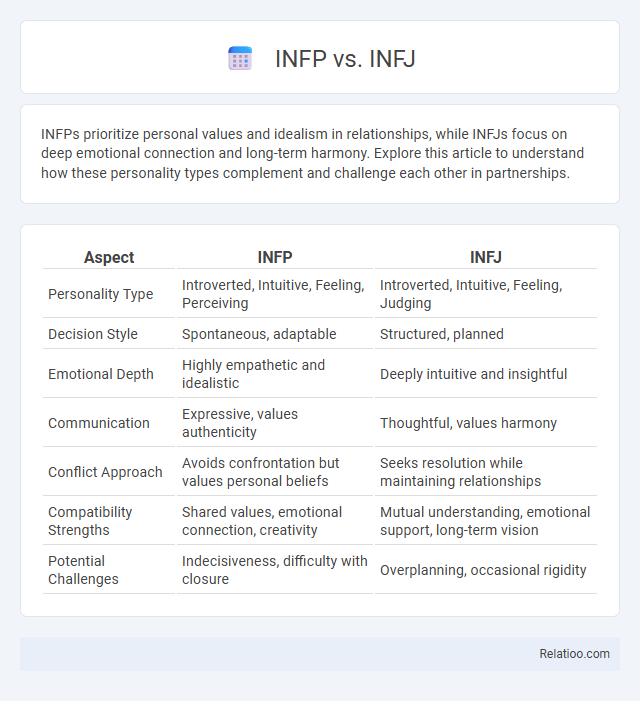INFPs prioritize personal values and idealism in relationships, while INFJs focus on deep emotional connection and long-term harmony. Explore this article to understand how these personality types complement and challenge each other in partnerships.
Table of Comparison
| Aspect | INFP | INFJ |
|---|---|---|
| Personality Type | Introverted, Intuitive, Feeling, Perceiving | Introverted, Intuitive, Feeling, Judging |
| Decision Style | Spontaneous, adaptable | Structured, planned |
| Emotional Depth | Highly empathetic and idealistic | Deeply intuitive and insightful |
| Communication | Expressive, values authenticity | Thoughtful, values harmony |
| Conflict Approach | Avoids confrontation but values personal beliefs | Seeks resolution while maintaining relationships |
| Compatibility Strengths | Shared values, emotional connection, creativity | Mutual understanding, emotional support, long-term vision |
| Potential Challenges | Indecisiveness, difficulty with closure | Overplanning, occasional rigidity |
INFP vs INFJ: Core Personality Differences
INFPs prioritize individual values and emotional authenticity, often driven by idealism and personal growth, while INFJs focus on structured vision and understanding others' needs through intuition and empathy. INFPs engage with the world through open-ended possibilities and flexible decision-making, contrasting with INFJs' preference for organized plans and foresight. Desire for deep meaning underpins both types, but INFPs seek inner harmony whereas INFJs aim to influence and guide for a greater purpose.
Distinguishing Cognitive Functions of INFP and INFJ
INFPs primarily engage with the world through dominant Introverted Feeling (Fi), which drives deep personal values and emotional authenticity, while INFJs lead with Introverted Intuition (Ni), focusing on abstract patterns and future possibilities. The auxiliary function of Extraverted Intuition (Ne) in INFPs supports exploring ideas and possibilities flexibly, contrasting with the INFJ's Extraverted Feeling (Fe), which emphasizes social harmony and external emotional dynamics. This cognitive function distinction shapes INFPs' idealistic individualism versus INFJs' strategic empathy and insight, defining their unique approaches to desire and interpersonal connection.
Emotional Processing in INFP and INFJ Types
INFPs process emotions deeply through personal values and idealism, often reflecting inwardly to understand their feelings, while INFJs analyze emotions by seeking patterns and underlying meanings to help others empathize and grow. Your emotional experience as an INFP centers on authenticity and self-expression, whereas INFJs prioritize emotional harmony and insight to guide relationships. Both types rely heavily on intuition but differ in how they externalize or internalize their emotional journeys.
Communication Styles: INFP vs INFJ
INFPs communicate with a focus on authentic self-expression and personal values, often using empathetic and imaginative language to connect emotionally. INFJs prefer structured and insightful communication, aiming to convey deeper meanings and future possibilities while maintaining harmony. Your choice between these styles affects how effectively you build understanding and trust in relationships.
Decision-Making Patterns in INFPs vs INFJs
INFPs rely heavily on personal values and emotional authenticity when making decisions, often prioritizing harmony and individual meaning, while INFJs integrate intuition with structured insights to anticipate future outcomes and stakeholder needs. Your decision-making as an INFP may be more flexible and guided by internal ideals, contrasting with INFJs who prefer a more strategic, long-term approach rooted in both empathy and foresight. Desire drives INFPs to seek alignment with their core beliefs, whereas INFJs channel desire into achieving practical solutions that serve collective well-being.
Idealism and Values: INFP Compared to INFJ
INFPs exhibit profound idealism driven by personal values and emotional authenticity, prioritizing individual expression and inner harmony. INFJs, while also idealistic, channel their values into structured visions for social change, emphasizing external impact and long-term planning. Desire in INFPs centers on self-discovery and genuine connections, contrasting with INFJs' focus on guiding others toward collective growth and deeper understanding.
INFP vs INFJ in Relationships and Friendships
INFPs and INFJs both prioritize deep emotional connections, but INFPs approach relationships with idealistic passion and a strong desire for personal authenticity, while INFJs seek harmony and long-term emotional stability. In friendships, INFPs value individual expression and are often drawn to meaningful conversations about personal growth, whereas INFJs focus on empathetic support and guiding others toward their potential. Understanding your own desire for either spontaneous emotional exploration or structured emotional support can help you navigate the differences between INFP and INFJ dynamics in relationships and friendships.
Creativity and Problem-Solving: INFP vs INFJ Approaches
INFPs express creativity through imaginative and abstract ideas, often driven by personal values and emotional depth, while INFJs apply creativity more strategically, combining intuition with a strong focus on practical solutions for complex problems. Your approach to problem-solving as an INFP relies on open-ended exploration and empathetic insights, whereas INFJs utilize structured planning and foresight to address challenges effectively. Both types excel in creativity but differ in their methods of translating inspiration into action.
Common Misconceptions About INFPs and INFJs
INFPs and INFJs are often mistaken for being overly idealistic or emotionally fragile, but both types possess resilience and deep inner strength driven by their dominant functions--Introverted Feeling (Fi) for INFPs and Introverted Intuition (Ni) for INFJs. Unlike the misconception that INFJs are extroverted due to their "J" classification, they are introverts who process information deeply and require solitude to recharge. Desire for authenticity and meaningful connection intertwines their personalities, but INFPs value personal values more openly while INFJs prioritize strategic insight and future-oriented vision.
Choosing Your Path: Identifying If You’re INFP or INFJ
Choosing your path between INFP and INFJ personality types involves understanding key differences in decision-making and emotional processing. INFPs prioritize personal values and idealism, often driven by deep internal feelings, while INFJs focus on structured intuition and tend to seek harmony through empathetic insight. Identifying whether you resonate more with spontaneous creativity or strategic planning helps clarify if you align with the INFP's authentic self-expression or the INFJ's visionary guidance.

Infographic: INFP vs INFJ
 relatioo.com
relatioo.com